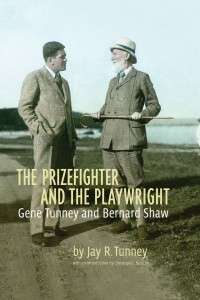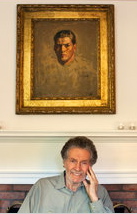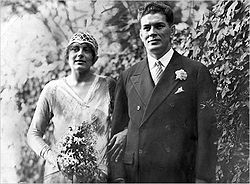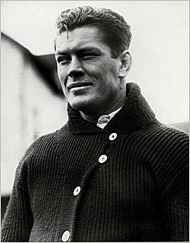“The prizefighter is no more what the spectators imagine him to be than the lady with the wand and the star, in the pantomime, is really a fairy queen…I have never been given to close personal friendships, as you know, and Gene Tunney is among the very few for whom I have established a warm affection. I enjoy his company as I have that of few men.”–George Bernard Shaw
Jay R. Tunney, a  son of the famous prizefighter Gene Tunney (and also vice-president of the International Shaw Society), recreates the story of the twenty-year friendship between his father and George Bernard Shaw with such love, admiration, and sensitivity to the intensely intellectual relationship between these two men that the reader cannot help but be swept up by this story of two men who, ignoring a forty-year age difference, found enduring satisfaction in each other’s company: John James (Gene) Tunney was thirty-two; Shaw was seventy-three when they met in 1929. Both men had already achieved the peaks of their professions by that time, and they now had the leisure to explore new realms. Tunney had retired as heavyweight champion of the world in 1928, and Shaw had won the Nobel Prize for Literature in 1925.
son of the famous prizefighter Gene Tunney (and also vice-president of the International Shaw Society), recreates the story of the twenty-year friendship between his father and George Bernard Shaw with such love, admiration, and sensitivity to the intensely intellectual relationship between these two men that the reader cannot help but be swept up by this story of two men who, ignoring a forty-year age difference, found enduring satisfaction in each other’s company: John James (Gene) Tunney was thirty-two; Shaw was seventy-three when they met in 1929. Both men had already achieved the peaks of their professions by that time, and they now had the leisure to explore new realms. Tunney had retired as heavyweight champion of the world in 1928, and Shaw had won the Nobel Prize for Literature in 1925.
Both men were Irish, both saw boxing as a noble sport representing Greek ideals, and both were passionately interested in serious literature. Shaw had participated in boxing matches as a young man himself, and he followed the sport religiously, even writing a novel about a prizefighter, Cashel Byron’s Profession. Tunney found in Shaw a mentor who treated him as an equal, listened to his ideas, and argued happily about the most erudite aspects of Shakespeare.

Tunney and Shaw met in 1929, while Tunney and his new bride, Polly Lauder Tunney, were on an extended honeymoon in Europe. Tunney persuaded Shaw and his wife to join them while they were staying on Brioni, an island in the Adriatic where their privacy was respected, and every day for a month, Tunney and Shaw would walk and talk for hours. Shaw has said that Tunney helped him “to plant my feet on solid ground.” And Tunney has said, “I think of Shaw as the most considerate person I have ever known. He was helpful, directing me aright on questions of literature, music, art, thought…No period of my life was more valuable than this. It was like a matriculation in a cosmic school.” When Polly, the new Mrs. Tunney, became deathly ill on Brioni, it was Shaw who spent hours there with his friend Tunney. Tunney never believed, as others did, that Shaw was the atheist he was purported to be.
The Tunneys were an exceptionally close couple, and their courtship – the story of a serious, young Irishman from Greenwich Village, who happened to be a prizefighter, and a shy young heiress of Andrew Carnegie from Connecticut – is a beautifully revealed love story by their son. Conducted in secret for about two years to avoid the press and to provide privacy for Mary Josephine (Polly) Lauder, the relationship became public only after Gene Tunney officially retired from the ring. Then, two weeks later, Polly’s mother announced her engagement. Their wedding was to be in Europe in the hopes that it would avoid the press, but, alas, that was not to be. They were pursued as relentlessly in Europe as they had been in the US. It was for this reason that they stayed on Brioni for a year – they had privacy there that they never had anywhere else.
Many years later, i t was Mrs. Tunney who suggested to her son Jay, who wanted to write about his father, that he avoid doing a straight biography. Those had been done in the past, and they had failed to capture Tunney’s essence, often implying that his late-in-life academicism was a pose. She suggested that he write about the Shaw/Tunney relationship, which she had had ample opportunity to observe and to participate in. A testament to her vision and to her son’s commitment, this book is not only important to historians, but it is also a book with a great love story and an homage to a man who became a scholar without any traditional schooling.
t was Mrs. Tunney who suggested to her son Jay, who wanted to write about his father, that he avoid doing a straight biography. Those had been done in the past, and they had failed to capture Tunney’s essence, often implying that his late-in-life academicism was a pose. She suggested that he write about the Shaw/Tunney relationship, which she had had ample opportunity to observe and to participate in. A testament to her vision and to her son’s commitment, this book is not only important to historians, but it is also a book with a great love story and an homage to a man who became a scholar without any traditional schooling.
Brilliant, sensitive, and committed, Gene Tunney was an autodidact who could quote reams of Shakespeare and other poets, and his eventual lectures at Yale on Shakespeare (conducted without notes) were serious scholarship, accepted by the university as such. A friend of Billy Phelps (William Lyons Phelps, of Yale, who was an English professor there for forty-one years), Tunney also was friends with Thornton Wilder, with whom he traveled in Europe, and with Somerset Maugham, John P. Marquand, F. Scott Fitzgerald, Horace Walpole, H. G. Wells, Charlie Chaplin, Max Beerbohm, and Ernest Hemingway.

When Gene Tunney died in 1978, at the age of 81, the Boston Herald said, “Gentleman Gene left a legacy of physical and intellectual stamina that should inspire us all. The Washington Star added, “Mr. Tunney was given to quoting Shakespeare. He looked like an actor; he sailed to Europe to talk with George Bernard Shaw; he did not act like a pug…There was never any real understanding of this man, who was too gifted, too fast and driven, to stay where the people wanted him.” His son Jay has corrected that. His story of Gene Tunney will be considered the final, incisive word. (On my Favorites List for 2010, the best non-fiction I read all year.)
Photos, in order: The photo of Jay Tunney shows him in front of a portrait of his father by Sir John Lavery, which Polly Lauder Tunney purchased on their honeymoon. The photo is by Christopher Capozziello for the NYTimes: www.nytimes.com
The wedding photo is from http://en.wikipedia.org/wiki/Polly_Lauder_Tunner.
The photo of a smiling Tunney is by Associated Press: www.nytimes.com
